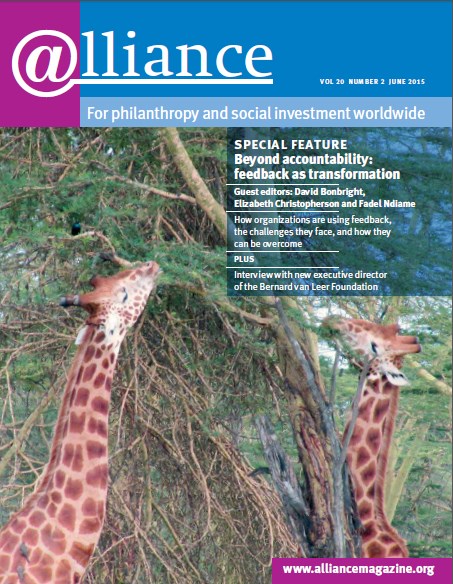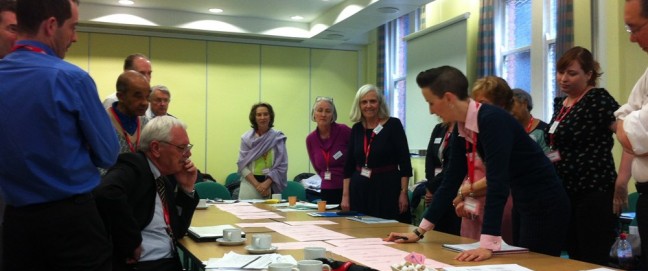Too often in the non-profit realm, customer feedback is synonymous with funder satisfaction. Don’t get me wrong: donors and investors are critical and valued stakeholders in any change-making operation. We should be seeking their feedback. However, non-profits must also begin to place equal, if not greater, emphasis on the feedback of another critical stakeholder: the non-profit’s beneficiary – or what we at Root Capital call our client.
Root Capital, a non-profit social lender that provides capital and financial training to small and growing agricultural businesses in poor places where the physical environment is fragile in Asia, Africa and Latin America, has always prided itself on being client-centric. The majority of our team live in the countries we serve; many come from rural communities, and some were former clients themselves. Our team essentially co-created Root Capital’s first financial products with our clients. Back then, there were so few clients (and staff) that it was easy to keep tabs on what they thought was working and what could be improved.
However, as we grew (we’ve now disbursed over $800 million in credit to 530 agricultural businesses, representing 1.1 million smallholder farmers around the world), we weren’t institutionalizing client feedback, nor were we approaching it in a systematic way. As our client portfolio grew, it became harder to keep our fingers on the pulse of our clients’ feedback.

Rwanda: parchment coffee being sun-dried on drying tables at Musasa cooperative. In 2005, Musasa became Root Capital’s first client in Africa.
Soliciting feedback
In 2010 we partnered with Keystone Accountability, a leading proponent of customer feedback in the international development community. Together with a cohort of other social financiers like Acumen and Grassroots Business Fund, we collaborated with Keystone on a Constituent Voice survey – an anonymous survey devised to capture feedback from our clients. The initial survey was designed to be general enough to work across the cohort of social financiers. While it yielded fascinating results, the design choices, anonymity and general questions meant that the findings offered limited actionable insights.
In 2013, we partnered again with Keystone to design a customized survey. This gave Root Capital’s clients the chance to report their satisfaction with specific products and services and provide suggestions for improvement. We decided not to make this survey anonymous, allowing for direct follow-up and swift action with individual clients.
The 100-question survey was administered online to all Root Capital’s active clients. Eighty-seven clients, 61 per cent of our active portfolio, completed the full survey. Respondents were representative of Root Capital’s global portfolio in terms of geography, industry and enterprise type.
Putting feedback to work
We were encouraged to learn that respondents were largely enthusiastic about Root Capital’s financial products and services. Where there was clear room for improvement, we acted on findings, helping our loan officers and regional credit directors to devise client-specific action plans.
For example, we learned that clients desire better communication from us about products, services, processes and expectations. We’re seeking to address this by hiring regional marketing managers in Latin America and Africa, responsible for client communication and feedback. The new positions will also play a strong role in the implementation, and ongoing management, of Constituent Voice at Root Capital.‘We learned that clients desire better communication from us about products, services, processes and expectations.’
We also discovered that in newer geographies, clients were becoming confused and frustrated by multiple contact points for our lending, risk monitoring, training and impact assessment teams. Recognizing the need for improved internal coordination, we appointed primary relationship managers for each client.
Finally, the experience provided valuable insights on how to shape Root Capital’s ongoing approach to Constituent Voice. We began with an assumption that integrating Constituent Voice would mean carrying out a comprehensive, portfolio-wide survey once a year, but feedback revealed that this could become burdensome for our clients. We therefore decided to instead conduct regular micro-surveys, asking only a few targeted questions at key points in our lending process (such as when a loan application is first submitted or a final payment is received). As our portfolio grows, more data comes in each day, requiring new resources and systems to maintain, analyse and act on it. It is an exciting challenge to have. Solving it will help us better serve our clients and accelerate our mission to grow rural prosperity.
For more information
http://www.rootcapital.org








Comments (0)